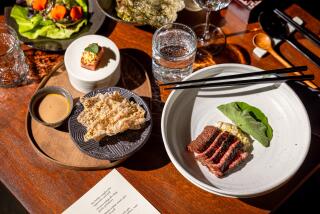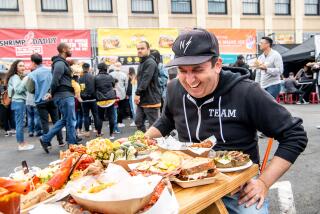A Buffet for the Mind
- Share via
His musings began with thoughts on an American culinary culture based less on olive oil, wine or fine taste than on fat substitutes and processed cheese.
He proceeded to talk about hiking through French hamlets to sip dry rose. He then discussed how peat moss helps determine the character of a good Irish whiskey. And he scoffed at the notion of differently shaped glasses for red and white wines.
Some of the hundred or more food and wine aficionados who came to hear Joe Coulombe speak Saturday at the Los Angeles Central Library would have liked to hear more about how he founded and ran Trader Joe’s, but they were delighted nonetheless with his rambling history lesson.
Coulombe, 67, who operated the specialty market chain until nine years ago, was the speaker at a monthly meeting of the Culinary Historians of Southern California, an organization that gathers to discuss subjects ranging from “Taming the Eggplant in 9th Century Baghdad” to a history of catsup.
“The important thing is to appreciate the beauty of food,” Coulombe concluded. After he spoke, the crowd filed into a courtyard to taste a disparate array of blue corn chips, brie and trail mix, washed down with French merlot, Brazilian coffee and unfiltered apple juice.
Club member Hendrik Leuvin, a cookbook author who served wine at the event, was impressed by Coulombe’s talk. “He was all over the map, but every point he made had some interest to it,” he said.
Diana Geller, a Beverly Hills resident who sells spices and exotic foods to restaurants, said she would rather have had Coulombe concentrate on Trader Joe’s than on the general history of food and wine. But she did rave about a recent club lecture that initially struck her as less than riveting.
“They picked a subject that sounded so boring it made my teeth ache,” she said. “It was called tuna.”
*
But the speakers quickly caught her interest: a former fisherman from San Pedro, a former cannery owner, and a scientist who monitored how many fish were taken from the sea.
They spoke of the many varieties of tuna that used to be fished off the California coast, and she sampled about seven of them, she said.
“They talked about what it was like when fish were pulled from the sea in California,” she said. “It was thrilling.”
Other topics have included Native American food, winemaking in the mission period of Southern California, legendary Hollywood restaurants and private chefs who cook for celebrities.
On Saturday, Coulombe discussed what is known as the French paradox--the perplexing phenomenon of the French suffering less heart disease than Americans despite eating more cheese and oils and drinking more wine. He quoted studies that credited the health of the French to the European tradition of eating meals slowly, munching on fewer snacks and drinking more wine.
But Coulombe said these customs are in peril. Wine, which was long sipped to avoid dysentery from tainted water, is consumed less in France as municipal water supplies improve and bottled soda becomes more popular, he said. And where villagers used to retreat for lunch breaks of several hours, they are now eating on the run at fast-food restaurants.
“Things are changing, and I don’t know if the French paradox is going to hold up,” he said.
Coulombe also discussed how regional types of cooking and distilling developed based on the kinds of fuel available. The French cooked long-
simmering stews because they had adequate firewood, he said. The Irish only had peat with which to distill their whiskey.
“The reason the Chinese have woks is because they don’t have any fuel,” he said. “You have to get it done fast.”
*
As Coulombe wrapped up his lecture, hands shot up with questions about how he conceived Trader Joe’s.
“I designed it for people who are overeducated and underpaid,” he responded, provoking laughter. He opened his first outlet in South Pasadena in 1967. “Basically I married a health food store to a liquor store.”
More to Read
Eat your way across L.A.
Get our weekly Tasting Notes newsletter for reviews, news and more.
You may occasionally receive promotional content from the Los Angeles Times.











